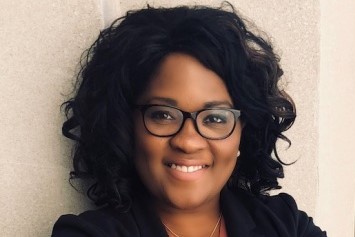In August 2019, the Department of Allied Health Sciences welcomed new faculty member, Kristen Cooksey Stowers, as assistant professor of health disparities.
“The most exciting part about joining the CAHNR is that I’m a part of this intellectual ecosystem of scholars,” Cooksey Stowers says. “I feel at home and excited about doing my work in a climate that is so supportive.”
Cooksey Stowers’s interdisciplinary research focuses on public policy and nutrition with regard to health equity for historically marginalized populations, food swamps, obesity gaps, and developing policies and legislation to improve relative access to healthy versus unhealthy food options. She served as SNAP Database Project team lead at the Duke-UNC USDA Center for Behavioral Economics and Healthy Food Choice.
As a postdoctoral fellow at UConn’s Rudd Center for Food Policy and Obesity, she worked on the Healthy Food Policy Project, a collaboration with the Mitchell Hamline School of Law and the Vermont Law School.
“I am focused on the extent to which policies, systems and environments perpetuate health inequities in marginalized populations and finding solutions to the widening disparities that we see over time. We need to both understand those mechanisms as well as think about potential policy changes, such as linking food banks to health care systems.”
While the term food desert is widely understood, food swamp is not as commonplace. “I happened to be working at the USDA when the food desert locator launched,” Cooksey Stowers explains. “Seeing how this kind of research could change the field and change public policy inspired me to pursue this career.”
A food swamp is a neighborhood or geographical area inundated with unhealthy food options relative to healthy food options, be it fast food restaurants or markets laden with high-fat ultra-processed foods. However, the solution is more complex than simply building a grocery store.
“In the past, we’ve pursued grocery stores without engaging the community or thinking about other store options nearby,” Cooksey Stowers says.
She is a member of the Invest Health Hartford Team, a Hartford coalition led by the United Way that includes a community task force of residents and other community members. Cooksey Stowers played a lead role in designing a resident survey on food habits in Hartford’s North End and discovered that many factors come into play when residents decide where to food shop–there can be cultural or emotional influences, the way residents are treated in a particular store, the cleanliness of the building as well as financial constraints.
The rate of severe food insecurity was higher than expected, Cooksey Stowers points out. “People try to understand how we see obesity among people suffering from food insecurity, but my research shows people experiencing severe food insecurities often rely on food pantries several times a week, and the data shows that these foods are calorie dense but not nutrient dense. It makes sense that these people are experiencing obesity, diabetes, hypertension and similar outcomes.”
She is currently working on two projects funded by InCHIP seed grants. One is designed to develop an audit tool to identify and measure food swamp environments, the other to facilitate a community-academic partnership that fosters funding and research related to the proposed Hartford Food System Healthy Hub.
“I’m very optimistic about the behind-the-scene efforts being made trying to build in the resident voice,” she says. “That is a critical element to creating long-term change”
During the spring 2020 semester, Cooksey Stowers is teaching a course on community-based health equity research. She explains that students find issues surrounding food and equity very relatable, and she enjoys working with undergraduate, graduate students, interns and a postdoctoral fellow in her lab at the Rudd Center.
Cooksey Stowers earned a bachelor’s degree in agriculture and consumer economics at the University of Illinois-Champaign, her master’s in public policy and a a public health certificate in health policy at Johns Hopkins University, and a doctorate in public policy with a concentration in medical sociology at the Duke University Sanford School of Public Policy. She moved to Storrs from the Chicago area in 2016 with her husband Daniel, a financial grants manager at Yale University, and their two daughters, Naomi and Phoebe.



